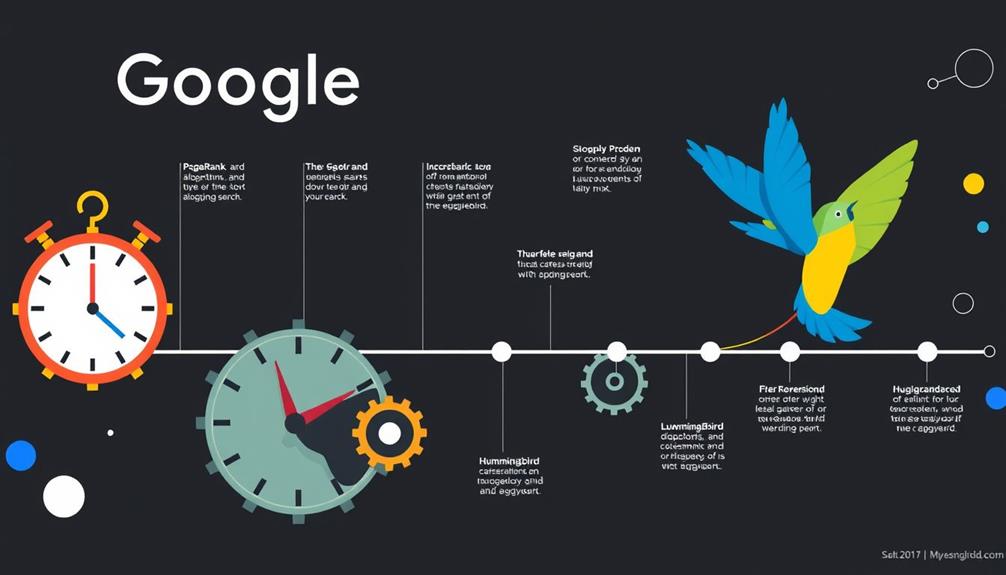Google's search algorithm has evolved dramatically since its launch in the late 1990s. Major updates like Panda and Penguin targeted content quality and spammy practices. Over the years, advancements in AI, such as RankBrain and BERT, improved understanding of user intent and language processing. More recent updates, including the Helpful Content System, emphasize genuine, helpful information amid the rise of AI-generated content. Google's continuous focus on mobile optimization and user experience has reshaped SEO practices. If you keep exploring, you'll discover more insights into how these changes impact your online search experience and strategies.
Key Takeaways
- Google's search algorithms have evolved since the late 1990s, with over 5,000 changes made in 2021 alone to enhance search quality.
- Major updates like Panda (2011) and Penguin (2012) targeted low-quality content and spammy links to promote ethical SEO practices.
- The introduction of RankBrain (2015) integrated machine learning, improving the algorithm's ability to understand complex search queries.
- The Helpful Content System Update (Sept 2023) prioritized genuinely helpful content amidst the rise of AI-generated material.
- Recent updates emphasize mobile optimization and user experience, with Core Web Vitals introduced to assess website performance.
Overview of Google's Algorithms
Google's search algorithms have transformed considerably since their inception in the late 1990s, adapting to the ever-changing landscape of online content. You might be surprised to learn that Google rolls out thousands of updates each year, with over 5,000 changes made in 2021 alone. This commitment to improving search quality shapes the way you approach search engine optimization (SEO).
As digital marketing budgets grow by 12% annually, staying informed about algorithm changes has become increasingly important for maximizing return on investment in effective marketing strategies.
Major algorithm updates like Panda and Penguin, launched in 2011 and 2012, respectively, have redefined SEO strategies by targeting low-quality content and spammy link practices. These updates highlight the importance of producing valuable content that meets user intent.
Core updates, released multiple times a year, further refine search quality, ensuring users find the most relevant results.
If you're in the digital marketing space, staying abreast of these algorithm updates is essential. Google's ongoing focus on quality content is exemplified by updates like the Helpful Content System and the Product Reviews Update, which reward insightful and original material.
Key Algorithm Updates Timeline

As you explore the key updates in Google's search algorithm, you'll notice significant shifts aimed at improving search quality and user experience.
The integration of AI in cybersecurity and machine learning has also played a vital role in understanding user intent, leading to more relevant search results.
From the Panda and Penguin updates targeting low-quality content and spammy links to the introduction of machine learning with RankBrain, each change reflects a response to evolving web practices.
Understanding these updates not only sheds light on spam management strategies but also highlights the growing role of AI in shaping search results.
Major Updates Overview
Over the years, significant updates have reshaped the landscape of online search, impacting how users find and interact with content. Understanding these major updates is essential for anyone looking to optimize their online presence.
Here's a quick overview of key algorithm updates:
| Update Name | Launch Date | Focus Area |
|---|---|---|
| Panda | February 2011 | Targeting low-quality content |
| Penguin | April 2012 | Combating spammy link practices |
| Hummingbird | August 2013 | Enhancing semantic search capabilities |
| RankBrain | October 2015 | Integrating machine learning |
Core Updates occur several times each year, with the November 2021 Core Update specifically aimed at improving overall search quality within just 13 days. Each update refines the Google Algorithm to deliver better results for user queries. While the Panda and Penguin updates tackled content quality and spammy links, the Hummingbird and RankBrain updates shifted focus towards understanding user intent and making search more intuitive. Staying informed on these updates helps you adapt your strategies for improved visibility in search results.
Spam Management Strategies
While staying informed about algorithm updates can seem intimidating, understanding how Google manages spam is vital for maintaining a healthy online presence.
Google's spam updates have evolved considerably over the years, targeting various forms of spam to enhance search quality. As with investments, avoiding gold IRA scams involves thorough research and verification, which can also be applied to evaluating the credibility of online sources and updates.
The June 2024 Spam Update introduced three new spam policies focused on expired domain abuse, scaled content abuse, and site reputation abuse, reflecting Google's commitment to improving user experience.
Similarly, the October 2023 Spam Update broadened language coverage and aimed at combating spam across multiple languages, ensuring a global reach.
One of the significant updates was the December 2022 Link Spam Algorithm Update, which leveraged Google's AI system, SpamBrain, to identify unnatural link practices. This was essential for improving the integrity of search results.
Additionally, the April 2023 Reviews Update emphasized authentic user-generated content, reinforcing the importance of quality reviews in combating spam.
Lastly, the Spam Update Part 2 launched in June 2021, targeted low-quality and manipulative practices, underscoring Google's ongoing battle against spam.
AI Integration Developments
The integration of artificial intelligence into Google's search algorithm represents a significant evolution in enhancing user experience and content relevance. With each update, you see AI integration developments that refine how content is ranked and presented.
| Date | Update Name | Key Features |
|---|---|---|
| Sept 2023 | Helpful Content Update | Refined algorithm to prioritize helpful content |
| Mar 2024 | Core Update | Reduced low-quality content by 45% |
| May 2024 | AI Overviews Update | AI-generated content summaries for 84% of searches |
| TBD | Gemini Model Integration | Improved relevance and accuracy in search results |
| Ongoing | Continuous AI Adjustments | Regular updates to enhance user experience and relevance |
These updates, including the helpful content updates, demonstrate Google's commitment to improving the Google search algorithm continually. The introduction of the Gemini model specifically tackles search-related tasks, ensuring that you get the most accurate and relevant results. As AI evolves, so does the way you interact with search engines, making it essential to stay informed about these changes.
Major Updates From 2000-2010
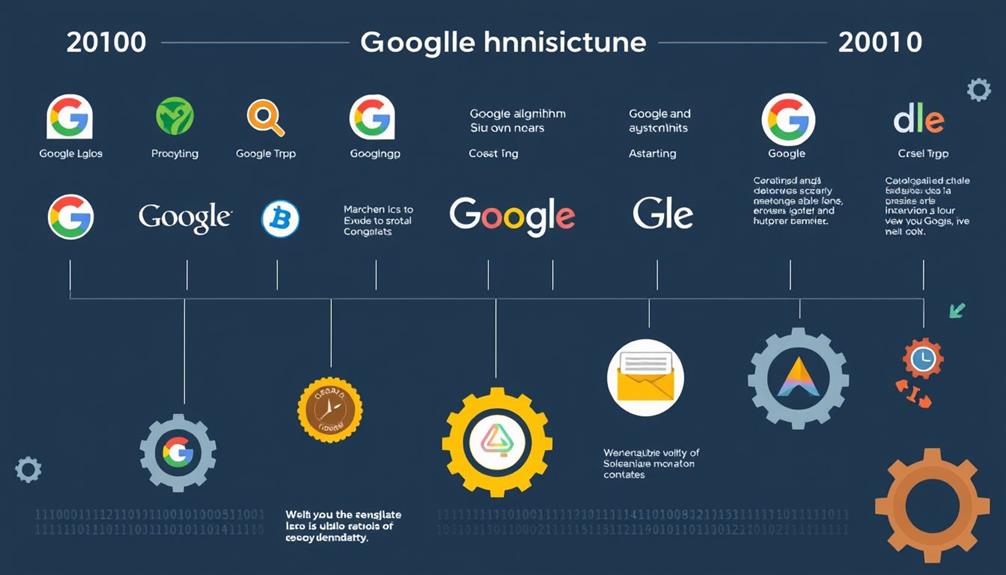
During the decade from 2000 to 2010, Google transformed the way users accessed information online through a series of significant updates to its search algorithm.
In 2002, Google made its first search algorithm update public, marking the start of regular enhancements aimed at improving result quality. The introduction of effortless topic idea generation became increasingly important as businesses sought to adapt their content strategies to align with these changes.
The Florida update in 2003 was a game changer, rendering many outdated 1990s SEO tactics ineffective and impacting numerous webmasters who relied on those techniques.
In 2005, Google introduced XML sitemaps through Webmaster Tools, making it easier for sites to be indexed. That same year, the nofollow attribute was launched to combat link spam, helping to guarantee that only quality links contributed to a site's ranking.
Fast forward to 2009, when the Caffeine update improved indexing speed and the freshness of search results, allowing users to access more timely content.
These updates set the stage for Google's ongoing efforts to filter out low-quality content and enhance the search experience.
Significant Changes From 2011-2020
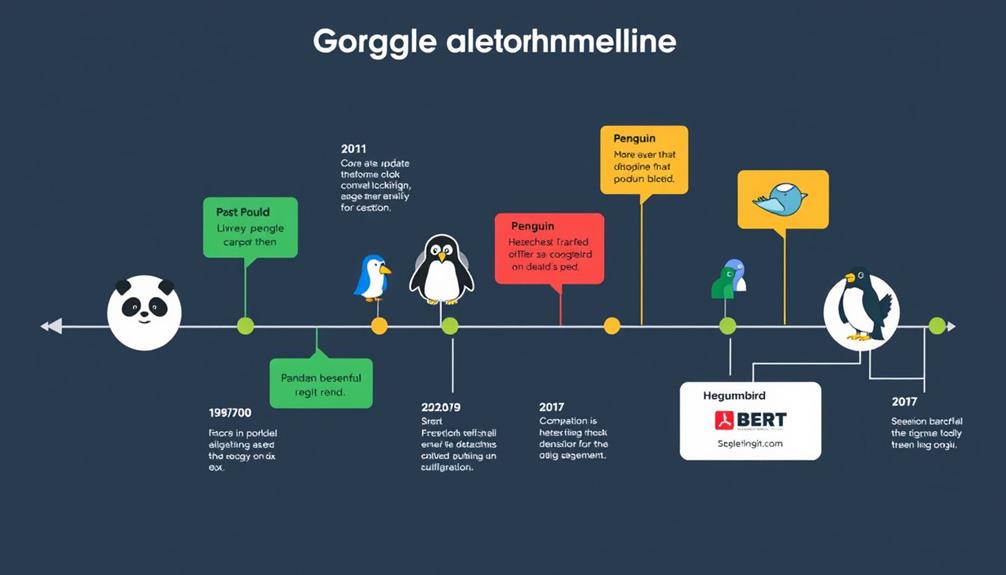
As Google continued to evolve its search algorithm from 2011 to 2020, significant updates reshaped the landscape of online content and search engine optimization.
The Panda update, launched in February 2011, targeted low-quality content and thin sites, affecting around 12% of search queries. This set a new standard for content quality, pushing you to prioritize valuable, well-researched information. Additionally, the rise of best websites for online earning emphasized the importance of high-quality content in driving traffic and generating revenue.
In April 2012, the Penguin update followed, focusing on spammy link practices. If you engaged in manipulative link-building tactics, you risked severe penalties. This prompted a shift toward ethical SEO practices, emphasizing organic growth.
The Hummingbird update, introduced in September 2013, improved Google's understanding of context in search queries. This made your content strategy even more vital, as relevance became a key factor in rankings.
Then, in October 2015, the RankBrain update utilized machine learning to interpret complex queries and user intent, further enhancing search accuracy.
From 2016 to 2020, Google rolled out multiple core updates, each designed to refine search quality. You likely noticed significant impacts across various sectors, which meant staying up-to-date with these changes was essential for your SEO success.
Recent Updates From 2021-2023
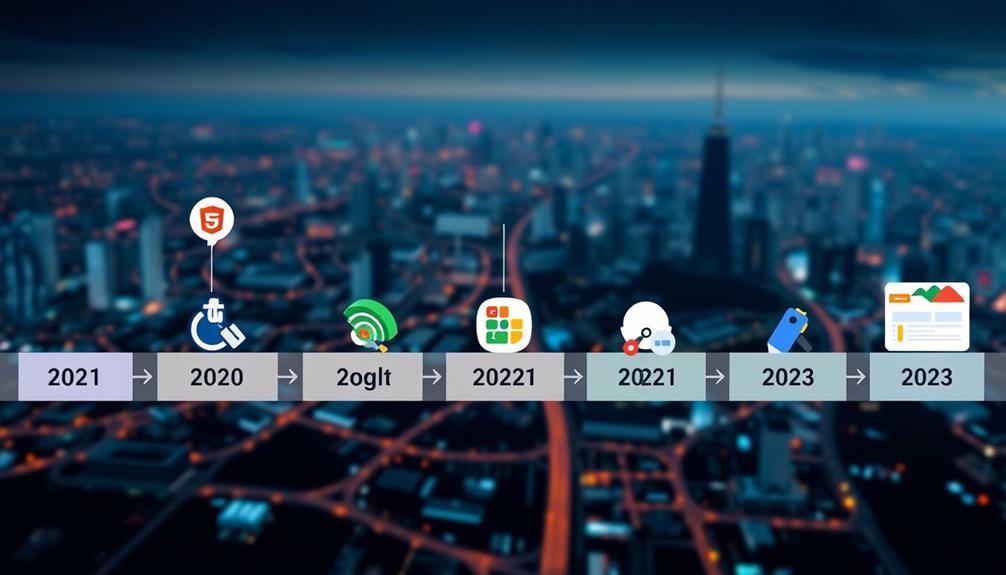
In recent years, Google has made substantial updates to its search algorithm, greatly impacting how content is ranked. The Product Reviews Update, rolled out in 2021, emphasized rewarding insightful and detailed reviews, pushing you to create more valuable content if you want to rank higher. This shift mirrors the need for authenticity and meaningful connections in interpersonal relationships, similar to the traits seen in individuals with narcissistic tendencies.
Fast forward to September 2023, when the Helpful Content System Update refined the algorithm further to prioritize genuinely helpful and insightful content, especially as AI-generated content becomes more prevalent.
In October 2023, the October 2023 Core Algorithm was launched, known for its significant ranking volatility. This update aimed to improve overall search quality and was accompanied by a Spam Update that targeted multiple languages, ensuring users receive relevant results regardless of their location or language preferences.
Additionally, the November Reviews Update, completed on November 8, 2023, focused on enhancing the quality of review content across web pages, reinforcing the importance of authentic and informative reviews.
These updates reflect Google's ongoing commitment to elevating content quality and user experience, pushing you to adapt your strategies to align with these changes.
Impact of Mobile Optimization

Mobile optimization isn't just a trend; it's a necessity for your website's success.
With Google's shift to mobile-first indexing, the mobile version of your site now takes precedence in rankings, making user experience on mobile devices essential.
As seen in various healthy lifestyle blogs, prioritizing mobile usability not only enhances accessibility but also encourages community engagement, which can lead to increased visibility.
If you're not prioritizing mobile usability, you could risk losing visibility and traffic.
Mobile-First Indexing Implementation
With the rise of mobile internet usage, Google's implementation of mobile-first indexing in 2018 marked a significant shift in how websites are ranked and indexed. As over 60% of global web traffic now comes from mobile devices, Google prioritized the mobile version of sites for indexing and ranking.
This change emphasizes the significance of mobile optimization as a key ranking factor, similar to the need for effective weight loss strategies during a Kilimanjaro trek. If your website isn't mobile-friendly, you risk lower visibility in search results, as Google places a strong emphasis on user experience.
The move to mobile-first indexing means that webmasters must guarantee their sites provide a seamless mobile experience. In 2020, Google announced that all new sites would be indexed with mobile-first indexing by default, clearly signaling the shift toward mobile usability.
Additionally, the Page Experience Update rolled out in 2021 introduced Core Web Vitals to assess user experience on mobile devices further.
This means that if you want to maintain or improve your search rankings, focusing on mobile optimization and user experience is no longer optional; it's crucial. Embrace mobile-first indexing to stay competitive in today's digital landscape.
User Experience Considerations
User experience has become a cornerstone of effective web design, especially in the mobile era. Since Google announced its major algorithm update in 2015, prioritizing mobile-friendly websites, the impact of mobile optimization has skyrocketed.
By 2018, the Mobile-First Indexing approach showed you that Google primarily looks at the mobile version of your content for indexing and ranking. This shift emphasizes the necessity for responsive design. Additionally, just as air purifiers improve indoor air quality, optimizing your website for mobile enhances the overall experience for users.
In 2020, Google introduced Core Web Vitals, establishing metrics that focus on loading performance, interactivity, and visual stability—elements essential for enhancing user experience.
The Page Experience Update in June 2021 further reinforced this, making mobile usability a significant ranking factor alongside Core Web Vitals.
With over half of global web traffic now coming from mobile devices, it's imperative for you to adopt a user-centric approach in your website design and functionality.
If you want to improve your search rankings and engage users effectively, prioritizing mobile optimization is no longer optional; it's a requirement.
Role of Machine Learning

Machine learning plays a pivotal role in shaping how Google delivers search results today. Since the introduction of RankBrain in 2015, Google has greatly integrated machine learning into its search algorithm, allowing it to better understand user queries and improve result relevance.
This technology has expanded with models like Gemini, which enhances search-related tasks and integrates AI-generated summaries directly into search results. The incorporation of AI enhances accuracy in medical diagnoses into various fields demonstrates the transformative impact of machine learning across industries.
Advancements in machine learning have also refined Google's spam detection systems. The December 2022 Link Spam Update utilized AI-based systems like SpamBrain to effectively combat unnatural links, ensuring users receive quality content.
Furthermore, ongoing algorithm updates, such as the Helpful Content Update in 2023, leverage machine learning to assess content quality and relevance. This emphasizes the importance of original and insightful information, driving content creators to focus on value.
User Experience Enhancements

As Google continues to refine its search capabilities, user experience has become a major focus.
The Page Experience Update emphasizes how vital factors like loading speed and interactivity affect your search satisfaction.
Additionally, the implementation of Passage Ranking helps surface relevant information within longer content, ensuring you find exactly what you need more quickly.
Page Experience Update
In June 2021, Google launched the Page Experience Update, transforming how websites are ranked by emphasizing user experience as a key factor. This update assessed multiple metrics related to user experience, with a strong focus on Core Web Vitals. These vitals evaluate loading performance, interactivity, and visual stability, ensuring that web pages deliver a seamless experience.
The Page Experience Update marked a significant shift toward prioritizing mobile-friendly sites, reflecting the growing trend of users browsing the web on their mobile devices. By rewarding sites that meet established usability standards, Google aimed to provide a more enjoyable and engaging search experience.
As the rollout progressed, you likely noticed how website rankings began to reflect the significance of user experience. Many sectors experienced notable changes in organic search performance, emphasizing that a site's usability now plays a critical role in its success.
To stay competitive, it's crucial to optimize your site according to these new standards. By focusing on Core Web Vitals and enhancing overall user experience, you can improve your search rankings and keep your audience engaged.
Passage Ranking Implementation
Following the emphasis on user experience with the Page Experience Update, Google introduced Passage Ranking in February 2021 to further enhance search relevance. This innovative feature allows you to find specific passages from web pages instead of sifting through entire articles.
By focusing on passage ranking, Google improves its ability to deliver precise information tailored to your nuanced queries. When you search for detailed or multi-faceted information, Passage Ranking prioritizes context and content relevance, helping you quickly locate direct answers to your questions.
This advancement showcases Google's deepening understanding of search intent, as it aligns search results more closely with what you're truly looking for. The implementation of Passage Ranking has positively impacted user engagement metrics.
With easier access to relevant information, you're likely to enjoy a better overall search experience. Google continually refines this feature, adapting it to your evolving needs and search behaviors.
This ongoing commitment to enhancing user experience through innovative algorithmic changes demonstrates how Google endeavors to keep its search results relevant and useful, making your online information-seeking journey more efficient and enjoyable.
Future of Search Algorithms

Anticipation surrounds the future of search algorithms, as Google gears up to enhance user satisfaction and deliver more accurate information. You can expect significant advancements with a strong focus on integrating AI technologies like the Gemini model, which will refine content relevance.
These updates will prioritize high-quality product reviews and expert content, reinforcing the importance of E.E.A.T. principles—Expertise, Authoritativeness, and Trustworthiness—in search rankings.
As Google continuously adjusts its algorithms, it responds nimbly to user behavior and technological shifts. This agile approach guarantees that search results remain relevant in an ever-evolving digital landscape.
Future updates will also implement advanced spam detection systems designed to mitigate low-quality content, which means you'll see a more valuable and trustworthy experience when searching.
With these improvements, you can anticipate a search environment that not only meets your needs but also promotes content that truly adds value.
As Google refines its algorithms, the emphasis on high-quality, reliable information will become increasingly pronounced, guaranteeing that your search efforts yield the best possible outcomes.
Consequences for SEO Practices
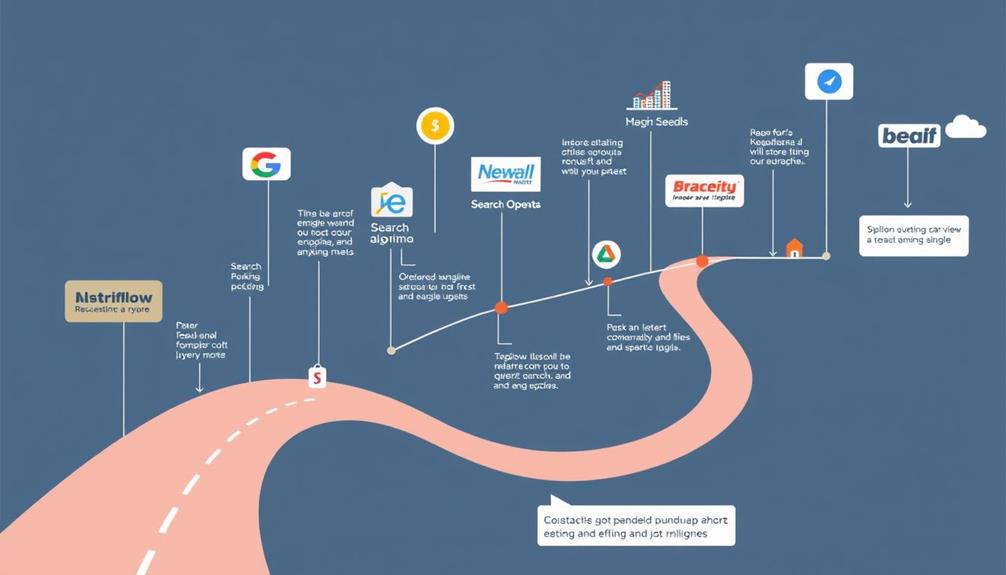
As Google's search algorithms evolve, SEO practices are undergoing a significant transformation. The introduction of core updates has reshaped how you approach content creation and optimization.
For instance, the Panda update in 2011 prioritized high-quality content, compelling you to move away from low-quality or "thin" sites. This shift forced many to reassess their content strategies.
Following the Penguin update in 2012, you'd to adopt ethical link-building techniques, as manipulative schemes faced harsh penalties.
Then, with the Hummingbird update in 2013, understanding user intent became essential. This meant optimizing your content around natural language, rather than just stuffing it with keywords.
Mobile-friendly updates starting in 2015 further changed the game, emphasizing the need for mobile optimization. If your site isn't mobile-friendly, you risk losing visibility in search results.
The ongoing core updates, like the November 2021 update, keep you on your toes, requiring constant adaptation of your SEO practices.
To succeed, focus on producing high-quality content that meets user needs and aligns with Google's evolving standards. Embrace these changes, and you'll not only improve your rankings but also enhance user experience.
Conclusion
As you navigate the ever-changing landscape of Google's search algorithms, it's like sailing a ship through shifting seas. Each update is a gust of wind, urging you to adjust your sails and refine your strategies. Embrace the journey, staying agile and informed, and let the waves of machine learning and user experience guide your course. The future of search is bright, but only for those who adapt and evolve with the tides of technology and user needs.
